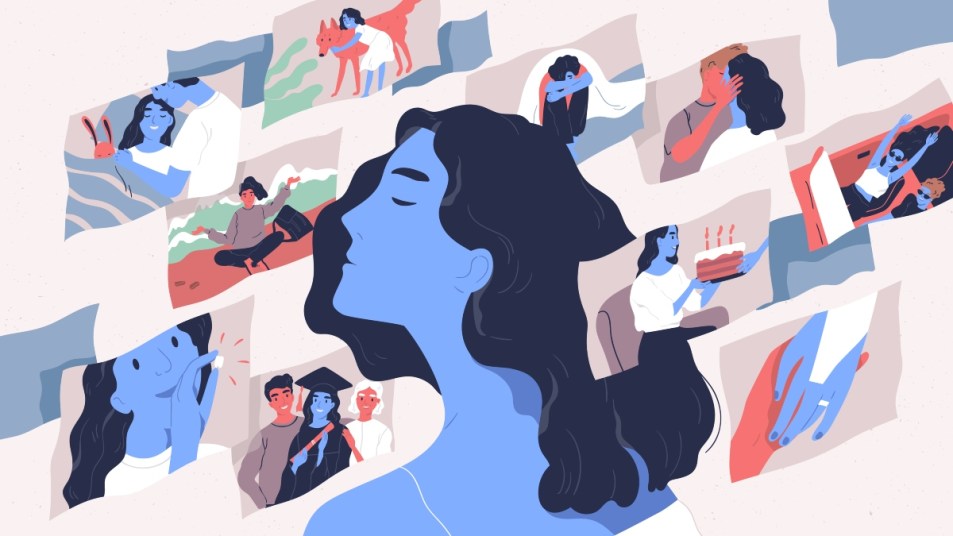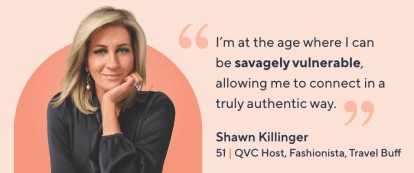Feeling Down? Psych Experts Share How To Use Nostalgia To Feel Better
Look to the past for a brighter present.

While your grandkids help you make red, white, and blue cupcakes for your family’s Memorial Day barbecue, you’re instantly transported back to when you were a little girl at your grandmother’s side, and her spatula seemed like a magic wand turning food coloring into a swirling rainbow. Nostalgia is a powerful “time machine,” and research shows it even alleviates negative feelings like anxiety and loneliness, while amplifying positive emotions like optimism and happiness. Here, experts reveal how nostalgia can tame stress and fill all your days with greater well-being. Keep reading for practical tips to embrace the power of nostalgia.
What exactly is nostalgia?
“Nostalgia is the sentimental longing for the past, and it’s so powerful because it’s a cocktail of both emotion and cognition,” says Clay Routledge, PhD, a leading expert in the psychology of nostalgia. He explains this sensation is unique because it sparks the newer “executive” parts of the brain involved in higher thinking, as well as the ancient sensory regions tasked with smell, taste, touch, sight, and sound. “When we’re nostalgic, our brain isn’t passive at all — it’s very active, helping us find meaning.”
Despite its roots in bittersweet memories, nostalgia is remarkably future-oriented, says Routledge. “When we ask people to write about nostalgic experiences, they often describe learning lessons or gaining wisdom that propels them forward, such as being reminded of the importance of family.” Put simply, nostalgia is a catalyst for personal progress. Read on for easy ways to let the power of memory boost your bliss, both in the moment and in the years to come.
Lonely? Tap ‘creative nostalgia.’
After your recent retirement, you miss your work friends and feel a bit isolated. But rather than reach out, you withdraw further. “One of the biggest challenges with loneliness is that it’s ‘self-reinforcing,’” says Routledge. “The pain it creates makes us retreat from the very thing that would alleviate our isolation: social support.”
The Solution
To relieve loneliness, follow your imagination down memory lane. “We did a study where we asked first-year college students who didn’t know many people to start scrapbooking with others, and they loved it, because it let them share memories and build connections,” says Routledge. Indeed, the profound pairing of creativity and nostalgia alleviates loneliness and encourages socializing. But you don’t necessarily have to scrapbook with a “club”: You can also make something on your own to share with loved ones — like a family cookbook of heirloom recipes — to create tangible reminiscences. This task eases loneliness and brings you closer through the power of collective nostalgia.
Stuck in a rut? Choose a ‘teen’ playlist.
Between ho-hum workdays and same-old chores, you feel listless. I wish I were a kid again, you think. “When we’re bored or disinterested, it’s often because we’re missing a sense of purpose,” says Routledge. And since nostalgia helps us discover more meaning in life, it can counteract such negative emotions.
The Solution
If your energy is at a low ebb, press play on few classic-to-you tunes. “When we listen to music we loved in our teens, we tend to feel significantly younger and enjoy an energy boost,” Routledge reveals, adding that to get the fountain-of-youth benefits, this music can’t just be upbeat—it has to be nostalgic, tied to fond memories. Research published in the Quarterly Journal of Experimental Psychology suggests that the music we listen to in our teens and young adulthood is often most nostalgic and connected to our sense of self. “Consider making a playlist you can listen to when you need to tap into a more adventurous spirit,” says Routledge. This “nostalgia soundtrack” will also help reconnect you to dreams you may have deferred that you just need a little nudge to go after once again.
Fearful? Recall your hero story.
As you watch the doom-filled news, you let out an audible sigh. What if I can’t handle the challenges ahead? you worry. “While anxiety can help us problem-solve, excessive fear can overwhelm us,” says David Ludden, PhD, professor of psychology at Georgia Gwinnett College. “But nostalgia can help us overcome dread and remember our own resilience.”
The Solution
When you feel pessimistic, find comfort in “intentional nostalgia,” the purposeful evocation of positive memories, suggests Routledge. He encourages journaling for just a few minutes about a specific experience where you overcame a challenge. “Ask yourself what this memory tells you about your identity, and how it informs your resilience,” he says, adding that nostalgia is a “personal version of history.” “In these experiences, we are the hero of our own story.” Simply reminiscing about times that taught us we’re stronger than we thought we were bolsters our sense of self-efficacy, the belief that we can surmount obstacles and succeed.
Overwhelmed? Savor anticipatory memories.
When your boss gives you a last-minute assignment that will likely drag into the weekend, you instantly feel frazzled. This summer is getting so busy, I just can’t keep up, you worry. Anxiety causes the perception of time to pass more quickly, causing a vicious cycle: We’re stressed that we don’t have enough time, and that very anxiety makes the time we do have seem fleeting.
The Solution
While stress makes us feel rushed, nostalgia expands our sense of time. “The more we’re able savor the moment, the more likely we’ll trigger anticipatory nostalgia, the feeling that we’re making a special memory that we’ll one day look back on,” explains Routledge. To help you do just that, consider grounding yourself in the present by naming five things you can see; four things you can touch; three things you can hear; and two things you can smell. Such mindfulness makes us feel more in control of our time, decreasing anxiety and hardwiring long-term memories. Nostalgia, after all, is shown to boost gratitude — and appreciating everyday moments will help us look back on the story of our lives with greater joy and purpose.
A version of this article originally appeared in our print magazine, First for Women.













